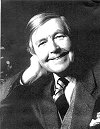

Adrian Smith and the Slaithwaite Philharmonic Orchestra by Arthur Butterworth
In the early 1960’s I became conductor of Huddersfield Philharmonic Orchestra, one of the country’s long-established and most consistently successful of amateur orchestras. It was, and still is, a large and flourishing organisation capable of playing the most demanding things in the whole orchestral repertoire. One of the second violins was the head of history at a local Catholic grammar school. Adrian Smith, a most enthusiastic amateur musician who, not long after my own appointment, became, perhaps unofficially, the associate conductor. At the time another orchestra, of much more modest status, also existed at the nearby small township of Slaithwaite some five miles down the industrial Colne Valley, on the main road over the Pennines towards Oldham. This was the Slaithwaite Philharmonic Orchestra. Like the Huddersfield Orchestra, Slaithwaite had been in existence since the last years of the nineteenth century.
Just before the First World War the Slaithwaite Orchestra had been a very flourishing affair; in the days when amateur orchestras competed in music festivals it had achieved some notable successes in this direction. However, the aftermath of the war led to its decline, so that the inter-war years saw some retrenchment which at one tine brought the organisation almost to the brink of extinction. While Huddersfield Philharmonic, especially after 1946 under my predecessor William Rees, began a steady increase in musical prowess so that I was fortunate enough to inherit a splendid and very sophisticated musical society, the Slaithwaite Orchestra languished.
Sometime in the early 1970’s the post of conductor at Slaithwaite fell vacant and it was suggested that Adrian Smith might be interested to take it on. So we at Huddersfield wished him all success in his new venture. It did not seem a promising prospect: a small orchestra in a much smaller township which did not possess a magnificent concert hall such as enjoyed by the Huddersfield Orchestra. (It needs to be remarked that Huddersfield Town Hall is one of the best concert halls in the north of England, renowned not only for the celebrated Choral Society, but for a very long tradition of first-rate music making of every kind since the 1880’s). At first Adrian Smith had to more or less make do with what he found at Slaithwaite. But he is not a person to be so easily satisfied, and within a few years the standard of orchestral playing, no less the enterprise of programme building began to be remarked on widely. Whereas the Huddersfield Philharmonic by and large pusued a programme policy that acknowledged the certainty of established repertoire, thereby ensuring a stable, loyal and large patronage, Adrian Smith had the ambition to take a chance and pursue a rather different line. In this he was probably a bit more fortunate than most conductors, who generally have to follow a policy agreed by orchestral committees, who in turn are conscious of the need to appeal to their patrons. It is to the credit of the Slaithwaite Orchestra’s management that Adrian Smith was allowed, if not exactly a free hand, at least a considerable personal choice in the matter of programme policy. At first this might not have seemed to be all that successful, but on the other hand the relatively smaller hall at Slaithwaite probably was a bit easier to fill than the much larger town hall at Huddersfield. However, to the immense credit of Adrian Smith, the orchestra’s success, once started never looked back. It was eventually decided that the orchestra should take a chance and give concerts in Huddersfield itself rather than restricting itself to the smaller township of Slaithwaite. At first the orchestra’s appearances in Huddersfield were confined to the fairly newly-created concert hall at St Paul’s, the university’s own hall. But not longer afterwards a move was made to the town hall itself. In 1990 Adrian Smith wrote the definitive history of his orchestra in An Improbable Centenary, a remarkable account, not just of an amateur orchestra, but of a whole community’s socio-musical tradition. From the late 1980’s the Slaithwaite Orchestra’s prowess went ahead by leaps and bounds: the most enterprising, far-sighted and imaginative programmes were presented -- not always invariably, it has to be admitted, perhaps to the most hoped-for capacity audiences - but always performed with gusto and immense enthusiasm by his band of most willing players. He has ever been supported by a committee of like-minded enthusiasts whose overall intention has been to offer its patrons some of the music that other orchestras - especially visiting professional ones -hesitate to promote on account of the ever present need to make the economics of the box-office viable.
In October this year Adrian Smith is to retire. He will leave behind him a flourishing musical organisation, which, as the title of his book so aptly suggests, must have seemed so improbable when he first took it on thirty years ago.

Slaithwaite Philharmonic Orchestra website
Return to index